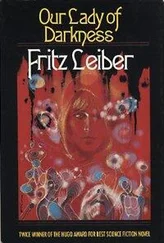AS: Stop, stop, STOP! Madam, the master files show that your phone is equipped with a miniaturized Important Trifle matter-receiver! It’s hidden in the earpiece! I will place the Cardinal pill on the bowl and—
OL: Ooooh… too late, tape… I’m dying…
AS: Please, madam. For my sake.
OL: No, tape… I’m going now… I leave the horrors to you… I’m dying… like your mother… I’m… dead…
The cadaverous old lady carefully dropped the phone, not on its prongs or the floor, but with a dull, short clatter on the edge of the thick pale marble top of the night table. She leaned back into the huge pillows. Something tiny rattled on the table top. She did not look. The phone called very faintly with an insect’s voice “Madam!” and “Mother!” again and again. She did not answer.
The storm was almost over, the lightning gone, the thunder faded; but now came a different thunder, a muted thunder, a thunder that grew and made the old lady frown. It drowned the phone’s faint screaming, like that of a far-off cicada.
Something shook the ceiling, then jarred it. There was a rapid tattoo of footsteps overhead, the creek and slam of a door, a clatter of footsteps down the silver stairs.
Approaching her briskly was a slim, middle-aged man carrying a black bag and shaking a few water drops off his trim gray suit.
“Well, what’s it this time?” he demanded with a cheery roughness. “Used your sleeping pills up too fast, I suppose, and then worked yourself into a tantrum. I’ll have you know I’ve delayed delivering the Governor’s daughter’s baby, just to make sure you keep me in your will.”
She grinned at him, the tip of her nose straining toward the point of her chin.
“The sleeping pills, yes, you clever devil. Oh, and I lost my temper with your stupid answering service.”
“Don’t blame you there. I curse them a dozen times a day myself. Only get psychoneurotics to take that job. Everyone else demands a social working-life. Now let’s just— What’s that?”
He had stopped with a jerk and was pointing at the phone.
In one frantic scramble the old lady thrust herself halfway across the bed and halfway out of the covers and crouched, looking back. She began to tremble as the doctor was trembling. But her lips were smiling, and her eyes glittered like jet.
Flowing steadily from the small black hole in the center of the pearl-gray receiver, rilling across and dropping down past the pale marble and puddling on the pearl-gray satin comforter was a thin rippling ribbon of bright blood.
Although it was a muggy August night in Chicago, the Lieutenant’s smile was as grim and frosty as a December, sunrise over the Loop.
“Let me see if I’ve got it straight so far, Mr. Groener,” he said. “This apartment isn’t your home. You and your wife were visiting Mrs. Labelle, an old friend. You occupied the front bedroom, just back of this living room. The back bedroom was occupied by another guest of Mrs. Labelle’s—a Miss Graves, also an old friend—Mrs. Labelle had the bedroom between.”
The big man sitting opposite the Lieutenant nodded dully, his face turned away from the bridge lamp cascading light on his chair.
“You went to bed about midnight,” the Lieutenant continued. “Mrs. Groener had been drinking heavily. At about two you woke and wanted a cup of coffee. You went back to the kitchen, past the other two bedrooms and through the dining room. While you were heating water, you heard Mrs. Groener scream. You found the bedroom empty. There was a cigarette burning out on the end of the sill of the open window beside a glass half full of straight whiskey. Four stories straight below you made out something turquoise-colored glimmering in the back courtyard.
“Mrs. Groener had been wearing a turquoise-colored long-sleeved nightgown. You knocked on Mrs. Labelle’s bedroom door and told her to call us. Then you hurried down. You were kneeling beside your wife’s dead body when we arrived. Correct?”
The big man slowly turned his head into the light. His face was that of a gaunt old matinee idol under its thatch of silvered dark hair. Then he looked straight at the Lieutenant and held out a steady, spread-fingered left hand.
“Except for one point,” Groener said. “When my wife screamed I didn’t rush back to the bedroom. I finished making my cup of coffee and I drank it first.”
The Lieutenant cocked an eyebrow. The younger blond detective who had been lounging wearily against the wall of the hallway sharply turned his wide face toward the speaker.
“Now and then Mrs. Groener used to scream,” the big man explained, “when she’d been drinking heavily I’d leave the bedroom. It may have been a rebuke or summons to me, or a fighting challenge to the whiskey bottle, or simply an expression of her rather dark evaluation of life. But it had never meant anything more real than that—until tonight.”
“Mrs. Groener was seeing a psychiatrist?” the Lieutenant asked harshly.
“I never was able to get her to,” the big man said. “As I imagine you find in your business, Lieutenant, there’s no real middle course between persuading a person to seek therapy voluntarily and having them forcibly committed to an institution. Mrs. Groener always had the energy be quite sane when necessary.”
The Lieutenant grunted noncommittally. “Well, you certainly seem to have been very long-suffering about it,” he said and then added sharply, “Cool, at any rate.”
Groener smiled bleakly. “I’m an alcoholic myself,” he said. “I know how lonely it gets way out there in the dark. I didn’t used to scream, but I pounded holes in the walls, and woke up to bloody plaster-powdered knuckles… and cigarette burns between my fingers.” He gave his head a little shake as if he’d been dreaming. “Thing is, I managed to quit five years ago. My wife didn’t.”
The long couch creaked as the Lieutenant slightly, shifted his position on the edge of the center of it. He nodded curtly.
“So when Mrs. Groener screamed,” he said, “you finished making your cup of coffee and you drank it. You thought she had screamed simply because she had become unnerved by heavy drinking. You were not unduly alarmed.”
Groener nodded. “I’m glad you didn’t say DTs,” he said. “Shows you know what it’s all about. Mrs. Groener never had DTs. If she had, I’d have been able to do something about her. I took my time drinking the coffee, by the way. I was hoping she’d be passed out again by the time I got to the bedroom.”
“This scream she gave—how loud would you say it was?”
“Pretty loud,” Groener said thoughtfully, “Almost loud enough, I’d say, to wake the people in the flat across the court—except that people in a big city never seem to bother about a scream next door.”
“Some of them don’t! Then it would have sounded still louder to Mrs. Labelle, or even Miss Graves, than to you. One of them might have been waked by it, or been awake, and gone to your wife’s bedroom.”
“No, they wouldn’t,” the big man disagreed. “They were familiar with Mrs. Groener’s emotional tendencies. They’re both old friends.”
“They still might have gone.”
Groener shook his head. “I’d have heard them.”
The Lieutenant frowned. “Has it occurred to you that one of the women may have gone to your wife before she screamed?”
Groener’s answering gaze was stony, “I’d have certainly heard them if they had,” he said.
The Lieutenant stood up and jerked his head at the blond detective, who came toward him.
“Through with me?” Groener asked.
“Yes,” the Lieutenant said. “When you get back to the dining room will you ask Cohan—that’s the other detective—to send in Miss Graves?”
Читать дальше











